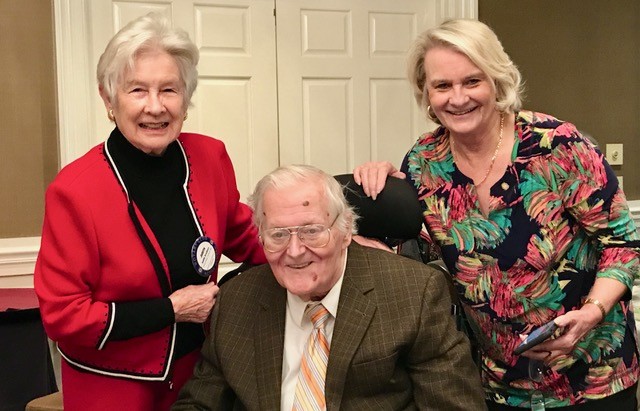Phill Bradbury’s smiles and laughs communicate so much about this man. They tell you a lot about the man behind them, his spirit and love of life and family, a man who today is unable to walk, use his hands, talk or even use a computer. But since joining in 2011, he rarely misses a meeting of the Rotary Club of Farragut.
There is not, however, one thing wrong with this mind, a mind that earned a degree in physics from Queen Mary College at the University of London and worked in the nuclear industry for 40 years.
Today, he’s 81 and has caregivers around the clock along with his bride of 59 years, Judith, or Dr. Judith A. Bradbury, who has a doctorate in international affairs from the University of Pittsburgh. They are both Brits and met in school.
His illness began in May 1999 when he was diagnosed with Parkinson’s disease. Judith says they had seen symptoms two years before the diagnosis. Read these words written by Phill several years ago:
“There are more than 1,000,000 Americans afflicted with this very debilitating disease – Parkinson’s – with hundreds more being diagnosed each day, yet it remains incurable. Parkinson’s is not of itself lethal, but its consequences are. The disease attacks the neurons, which carry two-way communication between the brain and the muscles to control all forms of bodily movement. Its final attacks can be on the muscles that control the beating of the heart and the expansion/contraction of the lungs for breathing.”
Parkinson’s is not his only problem. In 2009, he was told that he has CIDP – chronic inflammatory demyelinating polyneuropathy – an autoimmune disease that affects the nerves in his hands and feet. Combined with Parkinson’s, this has a pretty grim impact.
Again, before he lost the use of his hands, he wrote this: “I do not look upon this certain event (death) with any relish – yes, I have Parkinson’s. At that time in 1999, the average longevity following diagnosis was 10 years. Thus, I am living on borrowed time, thanks principally to excellent neurologists who for 15 years have provided a cocktail of drugs tailored to my changing condition and to a wonderful wife who is devoting her life to help me in this battle, which I will surely lose unless a cure is found.”
The Parkinson’s forced him to retire as senior vice president of BNFL Inc.’s Government Site Operations Group based in Fairfax, Va. He originally came to the United States in 1970 to work for Westinghouse’s nuclear business and worked on the design and licensing of the Clinch River Breeder Reactor, which was never built. When he worked for Bechtel, he was task manager for defueling the radioactive reactor at Three Mile Island. In the nuclear business world, he was a major player.
In April 2008 Judith says that Phill underwent deep brain stimulation at Johns Hopkins Hospital. It was a botched surgery, she says. “He went into the surgery walking and could not walk afterward. He was lucky to even survive. He was in ICU, months of rehab and afterward had to use a walker and cane to get around.”
Unless sleeping, he is mobile in his chair, which must be controlled by a caregiver. Someone must feed him, dress him, bathe him. “He lost the ability to use a computer three years ago, and it was a major loss for him,” Judith says.
“He gets very frustrated at times, and I so admire the fact that he has taken this all so well through the years,” Judith adds. “If I had been through what he has I would be utterly unbearable to live with. But Phill never, ever gives up, and he’s always pushed back against the illness.”
He was a Rotarian in Oak Ridge in the 1980s in the Breakfast Club there. When the Bradburys lived in Alexandria, Va., he was a member of the Rotary Club of Washington (D.C.). He was chair of the club’s World Community Services Committee and subsequently the District’s (7620) World Services, which helped fund a wide variety of humanitarian international projects – water projects in Argentina and HIV-AIDS in Ethiopia. He was twice named the club’s Rotarian of the Year.
“He really enjoys Rotary and being at the meetings,” Judith explains. “It has been a part of his life for a long time. Rotary was like a second job for him.”
Their three sons and four grandchildren live in Knoxville. He saves a lot of those laughs and smiles for them.
If you’re interested in exploring membership in Farragut Rotary, drop me an email. We meet at 12:15 p.m. each Wednesday at Fox Den Country Club.

